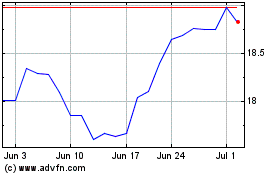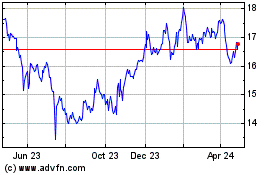AT&T-Time Warner Deal Is Mostly About Defense
October 23 2016 - 5:05PM
Dow Jones News
By Amol Sharma
AT&T Inc. and Time Warner Inc. are suiting up for the Great
Media Game. Their strategy to win is more about defense than
offense.
The strongest case for the gargantuan merger is that it is a
hedge against a future where the first point of entry for a media
consumer might be Netflix, Facebook, YouTube or Hulu, just as
easily as a cable or telecom company.
AT&T's $50 billion acquisition of DirecTV tethered the
telecom giant to a pay-TV business that has begun to decline and
could be in store for serious pain if cord-cutting accelerates. The
good news for AT&T, Comcast Corp., and others is that consumers
will still need broadband subscriptions to sign up for their
favorite streaming services.
Now, with the Time Warner deal, there will be another hedge for
AT&T: Any emerging streaming platform will need to license
content from the big media conglomerates to survive. Time Warner
won't likely be left out of any aspiring "skinny" online TV bundle
from Google, Amazon or Apple, or TV-like platform on social media,
be it via Facebook, Snapchat or Twitter. (A side benefit: AT&T
will take on Time Warner's 10% ownership of Hulu alongside Comcast,
Walt Disney Co. and 21st Century Fox Inc.)
AT&T Chief Executive Randall Stephenson noted that Time
Warner had created an "amazing franchise" by distributing its
content through many outlets, and "we don't imagine that
changing."
Time Warner doesn't have as much territory to defend on the
cable dial as companies that own a dozen or two dozen channels.
Most of its wealth is tied up in premium channel HBO, TNT, TBS and
CNN. So there hardly could be a better target in the media world
for companies planning for the breakup of the
every-channel-under-the-sun cable bundle.
OK, so "defense wins championships," right? But what about the
alternate case, that great offense prevails?
Obviously, AT&T would rather be the new TV distributor of
the future. Its planned DirecTV Now streaming service is a start.
One could imagine, to the extent regulators allow it -- and that is
an open question -- opportunities to package HBO, TNT and CNN
content for AT&T mobile video customers in new and interesting
ways.
"There's more video going on mobile," Time Warner CEO Jeff
Bewkes said in an interview. "That's why AT&T with its scale is
such a great home for our content."
Mr. Bewkes also points to new opportunities to do
household-level targeting with ads, making them more valuable and
supporting content costs. Of course, AT&T was already in
position to do much of that sophisticated ad targeting without Time
Warner's help.
The risk for AT&T is that a new entrant in the media-telecom
world will have more game. What if Amazon, which already has
growing TV ambitions, floats a new cablelike bundle that takes
advantage of its e-commerce store -- running ads before shows that
direct viewers to buy diapers or shoes on its site? That might very
well allow Amazon to offer TV services for lower retail prices than
competitors.
Or what if Facebook grows so powerful as a video conduit that it
effectively becomes the future of broadcast?
For Time Warner, the decision to sell now is also something of a
hedge -- a defensive maneuver. On a micro level, the company is in
as solid shape as one could hope in a turbulent media world. CNN's
ratings are flying high on election coverage, but could crash down
to earth thereafter. The NBA playoffs on TNT were a huge hit last
spring, but if the NFL's recent ratings woes are any indication,
sports TV won't be immune to the pressures on the pay-TV bundle
forever.
On a macro level, the one thing media companies don't have is
access to consumers. Some TV networks, from CBS to HBO, are betting
they can build direct-to-consumer businesses on their own to cater
to the growing ranks of cord-cutters and cord-nevers. But they have
found, in many cases, that support from big traditional
distributors like cable providers -- the experts in marketing,
packaging and customer service -- would help those products gain
traction.
In AT&T, Time Warner will have a giant pay-TV and broadband
provider on its side. And to the extent AT&T creates more
digital media products -- on mobile or TV -- Time Warner will be
well placed.
The markets still generally place a premium on media stocks
compared with distribution ones, if their trading multiples are a
guide. But the gap has been narrowing, a sign that the true source
of power in the industry isn't so clear.
The "dumb pipes" and the must-see content need each other.
Write to Amol Sharma at amol.sharma@wsj.com
(END) Dow Jones Newswires
October 23, 2016 16:50 ET (20:50 GMT)
Copyright (c) 2016 Dow Jones & Company, Inc.
AT&T (NYSE:T)
Historical Stock Chart
From Mar 2024 to Apr 2024

AT&T (NYSE:T)
Historical Stock Chart
From Apr 2023 to Apr 2024
